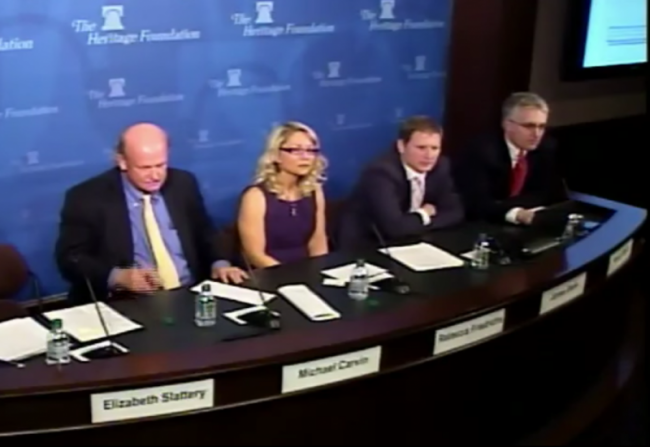Friedrichs: The Good, The Bad & The Ugly

Seated in the middle of Tuesday, January 12th’s panel at the Heritage Foundation, is a confident, well-spoken mother. She is Rebecca Friedrichs, the lead plaintiff of Friedrichs v. California Teachers Association (CTA). Friedrichs, along with nine other California teachers, has taken her union all the way to the Supreme Court for violating her First Amendment right through forced non-member union dues, known as “agency fees.”
Beside Friedrichs on the panel were Elizabeth Slattery and James Sherk of the Heritage Foundation, Michael Carvin, the plaintiff’s legal representation, and Patrick Wright of the Mackinac Center for Public Policy.
Overall, the panel appeared confident about the oral arguments, which were heard on Monday, January 11. Carvin, a partner at Jones Day, dismantled the defendant’s claim that the case would generate “free-riders,” individuals who benefit from, but do not financially contribute to, collective bargaining. Carvin clarified that these “free-riders” would be more accurately described as “compelled riders,” forced to fund a group they might morally disagree with. Therefore, Carvin concluded to the Court, these agency fees cannot be reconciled with the First Amendment and certainly cannot be justified.
Armed with charts and graphs, Wright’s report of the case proceedings concurred with the other hopeful panelists. He noted that unions still exist in the 25 Right to Work states and the Friedrichs case would put no union in danger of bankruptcy or even termination. In fact, Friedrichs has already increased accountability among union leadership.
The union defense’s outlook doesn’t look so optimistic.
With liberal sources writing headlines such as “Public Sector Unions Just Got Brutalized by the Supreme Court” and “The Supreme Court Can’t Wait to Get Rid of Public Unions,” it might be hard for union bosses to smile big for the cameras.
Even the United Federation of Teachers (UFT), a substantial New York teachers’ union, noted Justice Scalia’s comment, “the problem is that everything that is collectively bargained with the government is within the political sphere, almost by definition… all of those questions are necessarily political questions.”
If the Supreme Court does rule in favor of Friedrichs, as both the plaintiff side and the left-wing media suggest, agency fees will not only be known as inherently political, but a direct violation of the United States Constitution.
You can watch the entire panel here.
Image courtesy of The Heritage Foundation.





